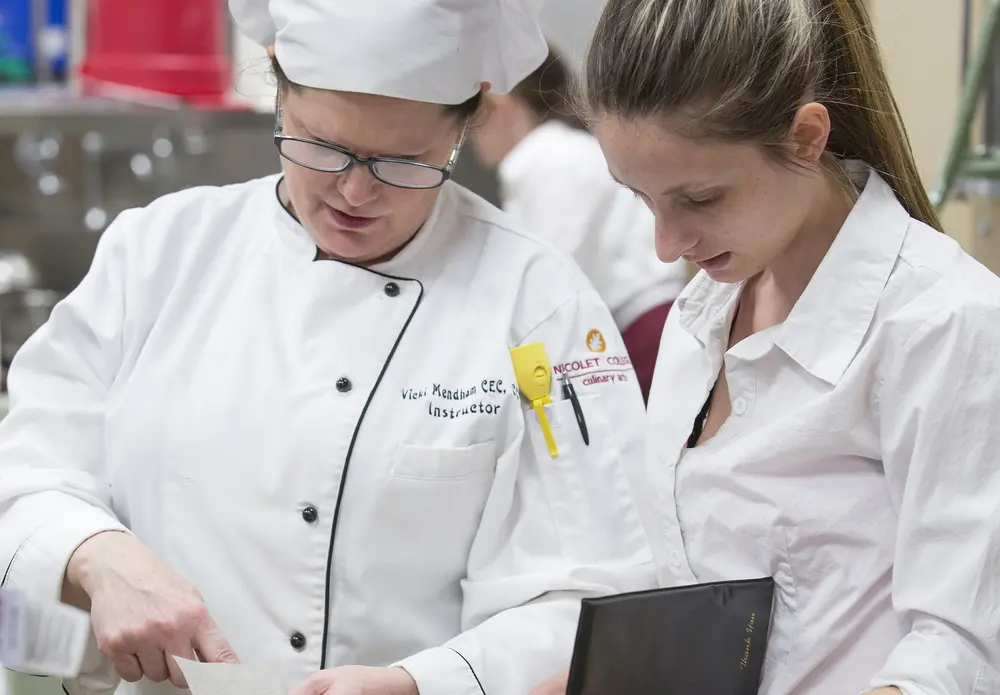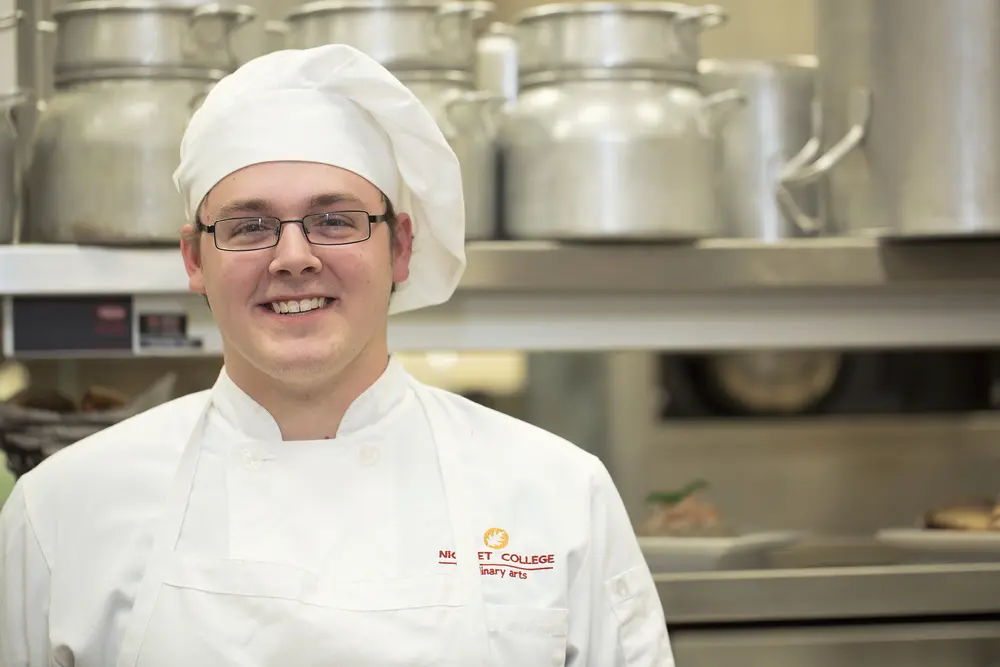Culinary Management
Plan, supervise, and manage food and beverage operations, restaurant facilities, and catering services. This program includes instruction in food/beverage operational skills as well as training in cost control, purchasing and storage, business administration, personnel management, culinary arts, restaurant and menu planning, event planning and management, health and safety, and applicable laws and regulations. It will also provide training for first-line supervisors of food preparation workers.
Program Outline
| Course # | Course Title | Credits |
|---|---|---|
| 1031611500 | Culinary MathDescriptionApplication of math procedures used by preparation, service, and management personnel in food service operations. Students solve problems in recipe sizing, costing and conversion, measurements, and equivalents, controlling costs, forms, and reports. |
2.00 |
| 1031612500 | Culinary PrinciplesDescriptionFood science principles applied to professional culinary food preparation. Units include professional kitchen operation, recipe terminology, and cooking techniques for various food categories. |
3.00 |
| 1031612600 | Culinary ApplicationsDescriptionProvides practical experience applying food science principles in food preparation, analysis, and evaluation of preparation techniques. Prerequisites: 1031612500 Culinary Principles (C or better) (concurrent enrollment allowed) and 1031612100 Sanitation and Safety Fundamentals (C or better) (concurrent enrollment allowed). |
3.00 |
| 1080119500 | Written CommunicationDescriptionDevelops writing skills which include prewriting, drafting, revising, and editing. A variety of writing assignments is designed to help the learner analyze audience and purpose, research and organize ideas, and format and design documents based on subject matter and content. Also develops critical reading and thinking skills through the analysis of a variety of written documents. |
3.00 |
| 1031612200 | Sanitation and Safety BasicsDescriptionLearn basic principles of sanitation and safety in order to maintain a safe and healthy food service environment. The course presents laws and regulations related to safety, fire, and sanitation and how to adhere to them in the food service operation. Successful completion of the course enables students to take a national sanitation certification examination. |
1.00 |
| 1031711000 | Culinary IndustryDescriptionThis course provides students with an introduction to the diverse opportunities within the culinary industry. Students will explore career pathways, industry trends, and fundamental culinary concepts while gaining insight into the full culinary program offered at the college.This course is designed for those considering a career in the culinary arts and serves as a foundation for further study in the program. |
1.00 |
| Course # | Course Title | Credits |
|---|---|---|
| 1080916600 | Intro to Ethics Theory and ApplicationDescriptionProvides a basic understanding of the theoretical foundations of ethical thought. Diverse ethical perspectives will be used to analyze and compare relevant issues. Students will critically evaluate individual, social and/or professional standards of behavior, and apply a systematic decision-making process to these situations. |
3.00 |
| 1080119600 | Oral Interpersonal CommunicationDescriptionFocuses upon developing speaking, verbal and nonverbal communications, and listening skills through individual presentations, groups activities, and other projects. |
3.00 |
| 1031611200 | Garde Manger BasicsDescriptionMethods and techniques of preparing and presenting food specialties created in the garde manger department are practiced. Hors d'oeuvres, salads, garnishing, food displays, charcuterie, and culinary competition units are included. |
3.00 |
| 1031613000 | NutritionDescriptionBasic nutritional principles are applied to responsible food preparation in the food service industry. Recipe analysis, modification, and menu planning for clientele are discussed. |
2.00 |
| 1031614000 | Food Practicum IDescriptionCafeteria style restaurant service applying principles, methods, and practices of professional food production. Students rotate weekly to kitchen and dining room stations. Prerequisites: 1031612100 Sanitation and Safety Fundamentals (C or better) and 1031612500 Culinary Principles (C or better) and 1031612600 Culinary Applications (C or better). |
3.00 |
| 1031614100 | Food Practicum IIDescriptionA'la carte restaurant service applying principles, methods, and practices of professional food production. Students rotate weekly to kitchen and dining room stations. Prerequisite: 1031614000 Food Practicum I (C or better) (concurrent enrollment allowed). |
3.00 |
| Course # | Course Title | Credits |
|---|---|---|
| 1080919900 | Psychology of Human RelationsDescriptionFocuses on improving personal and job-related relationships through understanding and applying sound psychological principles. Topics include self-concept, motivation, emotions, stress management, conflict resolution, and human relation processes. |
3.00 |
| 1010410100 | Marketing FundamentalsDescriptionThis course examines the business function of Marketing. Students will learn how marketers deliver value in satisfying customer needs and wants, determine which target markets the organization can best serve, and decide upon appropriate products, services, and programs to serve these markets. |
2.00 |
| 1031615500 | Menu PlanningDescriptionDevelops skill in planning creative, well-designed, and informative menus for use in the food service industry. Includes planning, design elements, layout, and copy writing. Prerequisites: 1031612100 Sanitation and Safety Fundamentals (C or better) and 1031612500 Culinary Principles (C or better) and 1031612600 Culinary Applications (C or better). |
2.00 |
| 1031616000 | Food PurchasingDescriptionExamines standards and specifications of food purchasing with emphasis on quality, grading, optimal price, and ordering requirements. Situational problems develop skills for work situations. Prerequisites: 1031611500 Culinary Math (C or better) and 1031612500 Culinary Principles (C or better) and 1031612600 Culinary Applications (C or better). |
2.00 |
| 1031712000 | Beverage ManagementDescriptionIntroduces the management, responsible service, and sales of beverages. The areas of planning, equipping, staffing, product knowledge and purchasing, inventory management, marketing, and legal regulations are included. The Responsible Beverage Server portion fulfills Wisconsin Statutes which requires new applicants/bartenders/operators to complete training before a license is issued. |
2.00 |
| 1014510100 | Entrepreneurship FundamentalsDescriptionStudents learn about key elements, risks and rewards of entrepreneurship and paths to developing the entrepreneurial mindset. Students use research and case studies to develop an idea for a new business and determine its viability. |
1.00 |
| Elective | ElectiveDescription |
3.00 |
| Course # | Course Title | Credits |
|---|---|---|
| 1080611200 | Principles of SustainabilityDescriptionPrepares the student to develop sustainable literacy, analyze the interconnections among the physical and biological sciences and environmental systems, summarize the effects of sustainability on health and well-being, analyze connections among social, economic, and environmental systems, employ energy conservation strategies to reduce the use of fossil fuels, investigate alternative energy options, evaluate options to current waste disposal and recycling in the U.S., and analyze approaches used by your community to promote and implement sustainability. |
3.00 |
| 1010110200 | Introduction to AccountingDescriptionStudents learn to apply debit/credit theory in preparing basic journal entries. Also includes financial statement ratios, bank reconciliations, and payroll. |
1.00 |
| 1010220100 | Business Law Foundation and TortsDescriptionThis course examines law and the ways it impacts business operations. The student will learn sources of business law and be exposed to jurisdiction, the adjudication process and the framework of the court system. Torts and intellectual property are also covered. |
1.00 |
| 1010220500 | Business Law ContractsDescriptionThis course will cover the basic requirements of contracts, how they may be breached and the process of collecting damages in a breach. Student will be exposed to The Uniform Commercial Code and the relationship between it and contract law. |
1.00 |
| 1010221000 | Business Law Entities and Real PropertyDescriptionThis class covers typical business entities such as sole proprietorship, partnership and corporation along with the advantages and disadvantages of each. Students will also learn the critical elements of real property and personal property laws. |
1.00 |
| 1010315500 | QuickBooks BasicsDescriptionStudents will process routine accounting transactions including company setup. |
1.00 |
| 1014511000 | Entrepreneurship Business Plan DevelopmentDescriptionStudents create a business plan using a proven framework to guide them through the process. They discover what it takes to identify an opportunity and refine their strategy with instructor feedback at each step. Final project includes a finished business plan and presentation for other stakeholders to prepare them to start a new venture. Prerequisite: Take 104-101; 104-105; Minimum Grade C; - Must be taken either prior to or at the same time as this course. |
2.00 |
| 1031617500 | Food Service Cost ControlDescriptionAnalysis of the factors affecting food and beverage cost control. Purchasing, receiving, preparation, storage, and inventory practices are examined. Prerequisite: 1031611500 Culinary Math (C or better). |
2.00 |
| 1031618100 | Food Service ManagementDescriptionIntroduction to food service management. Fundamentals of leadership, communication techniques, employee motivation, recruitment, hiring, training employees, and problem solving/decision making processes are covered. |
2.00 |
| 1031712100 | Dining Room ManagementDescriptionThis course emphasizes the service aspect of a hospitality business to create an exceptional customer experience. Examines how the dining room manager is responsible for maintaining standards of service, training of dining room staff, and motivating and monitoring staff to ensure customers’ expectations are being exceeded. The course covers general rules of various service types, how to handle reservations, functions and procedures for dining room staff, and using current point-of-sale technology. Also included are sales techniques for service personnel including menu knowledge and suggestive selling. Prerequisite: 1031614100 Food Practicum II (C or better). |
2.00 |
At A Glance
How You'll Learn
On Campus
OnLine
Term Starts
Spring 2026
January 12 - 16-Week Spring Term Start
Summer 2026
May 18 - 12-Week Summer Term Start
Start dates represent the beginning of a new term. Certain programs or courses may not be available to start every term. Please view the course schedules for a list of upcoming classes or contact the Welcome Center at 715-365-4493.
Program Tuition*
$10,924
Books & Supplies*
$1,350
*Total cost for degree completion is estimated by current course requirements, books, and supplies. Tuition and fees are set by the Wisconsin Technical College System and subject to change.
Financial Aid Eligible
Potential Indirect Costs
You may experience these additional costs, not charged by Nicolet, estimated based on length of program.
What You'll Learn
- Apply principles of safety and sanitation in food service operations
- Apply principles of nutrition
- Demonstrate culinary skills
- Manage food service operations
- Plan a menu
- Analyze food service financial information
- Relate food service operations to sustainability
Transfer Opportunities
Take a look at our transfer agreements to seamlessly transfer your degree to a 4-year university.
Your Potential Careers
- Food Service Manager
Median Annual Salary
| $29,282 | $32,720 | $33,704 |
| Local | State | National |
|---|
Lightcast 2023.1
Get Started
Your application can be submitted online, it takes just a few minutes to complete.
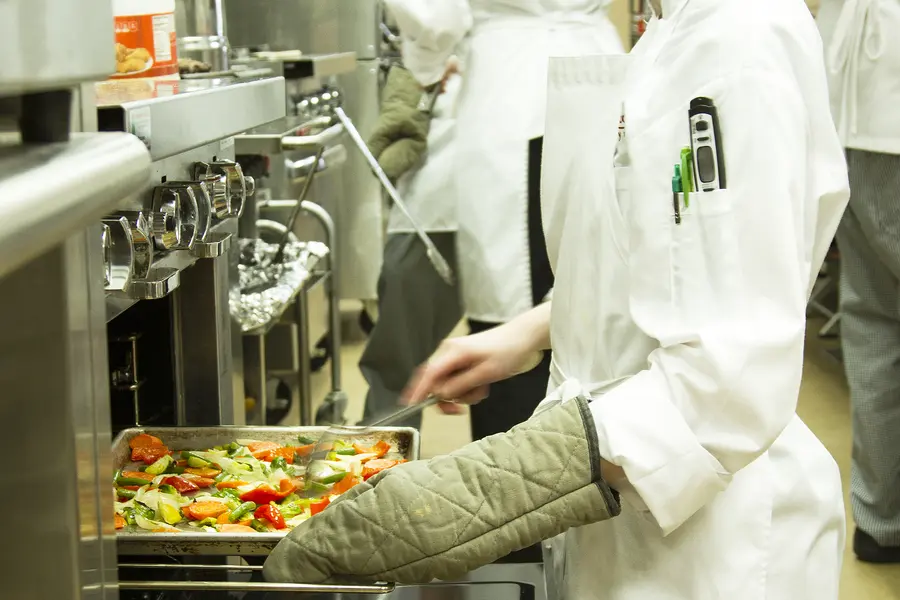
Related Programs

Become a Student
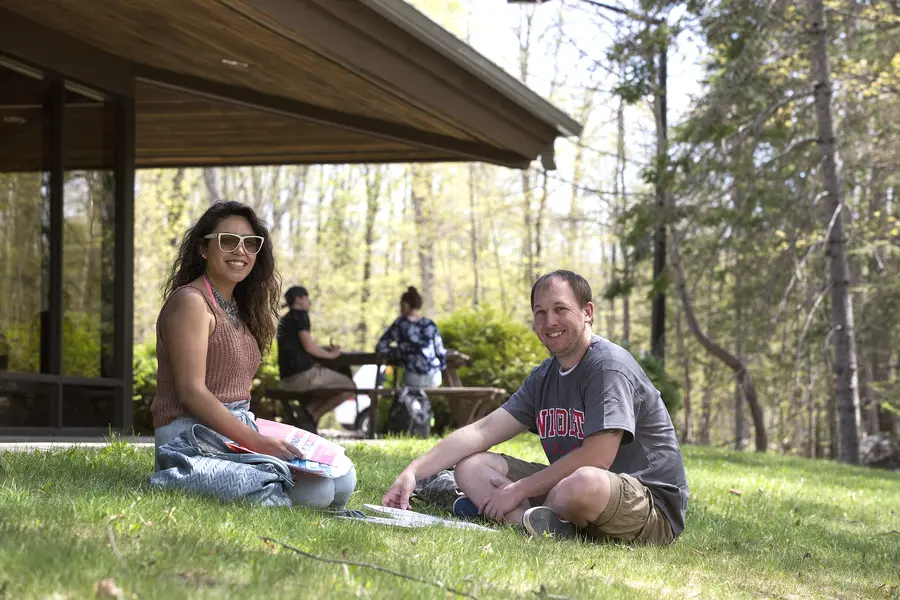
Earn a Bachelor's Degree
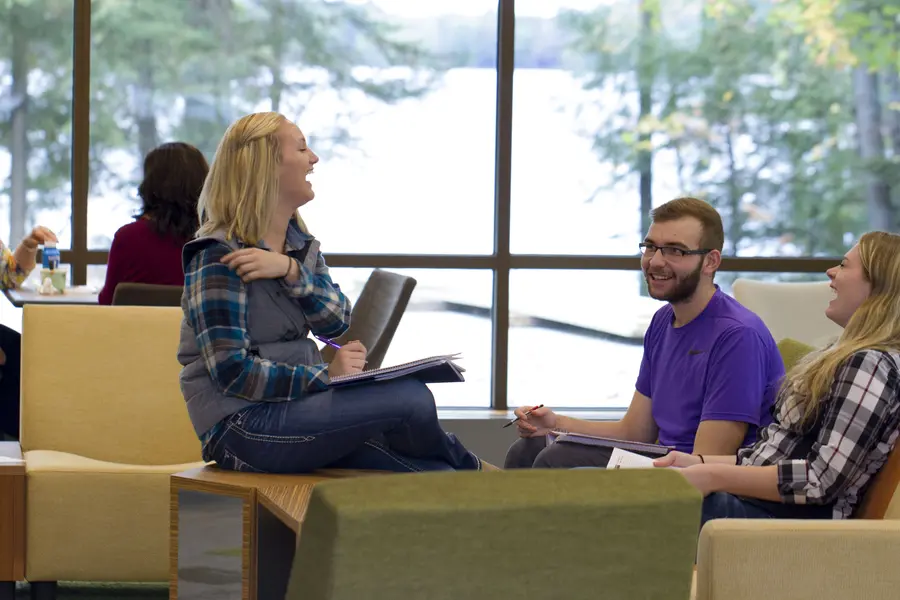
Prepare for College

